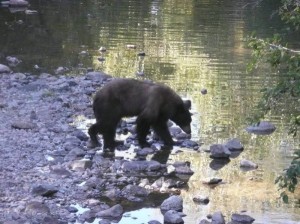Drought Causing More Bear Break-Ins?

It really hit me how dire California’s drought crisis is becoming when I received my October issue of National Geographic, which included a lengthy report and included some staggering photos of ridiculously-low lakes like Oroville and Shasta, not to mention once fertile Central Valley farmlands now looking like a reincarnation of the Oklahoma Dust bowl days, which ultimately brought farmers from the Great Plains to then lush California for a chance at a better life.
Just one more reason to be concerned about the continuing trend of water shortages is what seems like an abundance of bears breaking into homes around California’s and Nevada’s Sierras communities. The bruins’ lack of food and water sources, which may or not be directly tied into the drought conditions around the state, is an issue, says a report from Fox 40 in Sacramento. Here’s more news from AccuWeather’s Kevin Byrne:
The dearth of water has stalled the growth of available wild foods, such as grasses, natural fruits and nuts, which grow in upper regions of the Sierra Nevada that the bears call home.
When these natural foods fail to mature in the volume needed, there is not enough to sustain the bear population in Nevada or California’s Lake Tahoe Basin, Nevada Department of Wildlife (NDOW) Spokesman Chris Healy said.
“Often times, unfortunately, because a lot of our urban areas here in Nevada are right up to the foothills of the Sierra Nevada, the bears will extend their search for garbage,” Healy said. “And the more the drought conditions have affected the natural food supply for the bears, means that we’re going to have more interactions with bears searching for garbage.”
Eighty percent of the state of Nevada is under severe drought conditions, with half of the state suffering from extreme drought conditions, according to the U.S. Drought Monitor. …
Across state lines in California, black bears routinely wander into urban environments throughout the Sierra every year, said Jason Holley, a supervising wildlife biologist for the California Department of Fish and Wildlife.
While there have been some interesting bear incidents that could be attributed to the drought this summer, there’s no direct data to show correlation to the drought, Holley said.
“The one thing we do suspect, is that since this drought is so severe and it’s gone on so long, we do suspect that it has increased the need for bears to wander farther in finding their food and finding their daily water needs,” he said.
“And in turn, that increases the likelihood that they come across people or they come across roads.”



